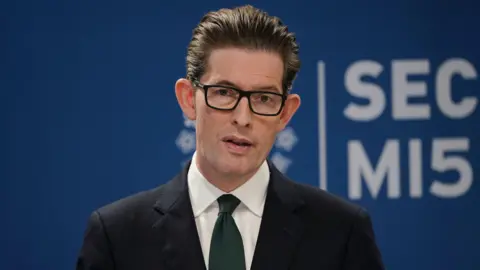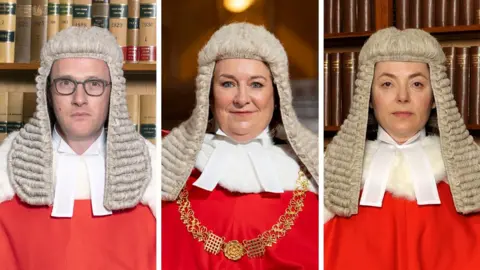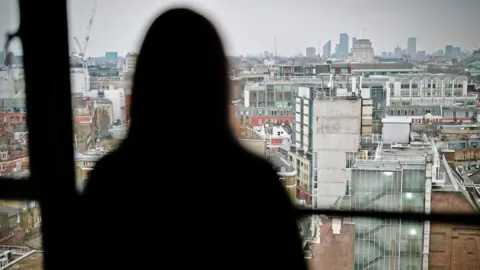Judges order 'robust' inquiry into MI5 false evidence
 PA Media
PA MediaThe High Court has ordered a "robust and independent" new investigation into how MI5 gave false evidence to multiple courts, after rejecting two official inquiries provided by the Security Service as seriously "deficient".
The two reviews took place after the BBC revealed MI5 had lied to three courts in a case concerning a neo-Nazi state agent who abused women.
A panel of three senior judges said it would be "premature" to decide whether to begin contempt of court proceedings against any individuals before the new investigation was complete.
They also "commended" the BBC for "bringing these matters to light".
The two official inquiries, one of which was commissioned by Home Secretary Yvette Cooper, absolved MI5 and its officers of deliberate wrongdoing.
But the judgement concludes that the "investigations carried out by MI5 to date suffer from serious procedural deficiencies" and that "we cannot rely on their conclusions".
The three judges - England and Wales' most senior judge, Lady Chief Justice Baroness Sue Carr, President of the King's Bench Division Dame Victoria Sharp and Mr Justice Chamberlain, said: "It is to be hoped that events such as these will never be repeated."
Their judgement says the new investigation should be carried out under the auspices of the Investigatory Powers Commissioner Sir Brian Leveson, who has oversight of MI5's surveillance activities. His office, IPCO, was also provided with false evidence by MI5 in the case.
Sir Brian said: "It is clear that MI5's compliance with its statutory duties fell short in this case."
He noted the recommendation that IPCO should carry out the new investigation said he would await "direction from the prime minister".
MI5 director general Sir Ken McCallum repeated his "full and unreserved apology for the errors made in these proceedings".
He said resolving this matter was "of the highest priority for MI5" and that they would co-operate fully with IPCO.
"MI5's job is to keep the country safe. Maintaining the trust of the courts is essential to that mission," he said.
A BBC spokesperson said: "We are pleased this decision has been reached and that the key role of our journalist Daniel De Simone in bringing this to light has been acknowledged by the judges.
"We believe our journalism on this story has always been in the highest public interest."
 Avalon/PA
Avalon/PAThe case began in 2022 with an attempt to block the BBC from publishing a story about a neo-Nazi agent known as X. It has become a major test of how the courts view MI5 and the credibility of its evidence.
MI5 gave evidence to three courts, saying that it had never breached its core secrecy policy of neither confirming nor denying (NCND) that X was a state agent.
But in February, the BBC was able to prove with notes and recordings of phone calls with MI5 that this was false.
An MI5 officer had confirmed the agent's status as he tried to persuade me to drop an investigation into X, a violent misogynist who used his Security Service role to coerce and terrify his former girlfriend, known publicly as "Beth".
Beth's lawyer, Kate Ellis from the Centre for Women's Justice, said the judgement was a "clear rejection" of MI5's explanations so far and a "serious warning" to the Security Service to cooperate.
She said the judges expressed concerns about "the ease" with which MI5 was able to "hide behind" the NCND policy - and warned that none of the safeguards to hold it accountable can work properly without "high standards of candour".
The two official inquiries criticised by the High Court were an internal MI5 inquiry and an "external" investigation by the government's former chief lawyer, Sir Jonathan Jones KC. The latter was commissioned by the home sectary and Sir Ken.
But the judgement said that "there was in our view a fundamental incoherence in Sir Jonathan's terms of reference".

The ruling said he was asked to establish the facts of what happened but not to "make findings about why specific individuals did or did not do certain things".
However, the judges said Sir Jonathan nevertheless "did make findings" that there was no deliberate attempt by anyone to mislead the court - without ever speaking to an MI5 officer at the centre of the case and without considering key additional BBC evidence about what took place.
The judgement also found that MI5's director general of strategy, who is the organisation's third-in-command, gave misleading assurances to the court in a witness statement.
He said its original explanations were "a fair and accurate account" of secret material which, at that point, had not been disclosed.
The court forced the government and MI5 to hand over the material, and the judges concluded that MI5's explanations were not "fair and accurate" and "omitted several critical matters" - including that IPCO had been misled and what was known by several MI5 officers at relevant times.
Their judgement said that it was "regrettable that MI5's explanations to this court were given in a piecemeal and unsatisfactory way - and only following the repeated intervention of the court".
"The impression has been created that the true circumstances in which false evidence came to be given have had to be extracted from, not volunteered by, MI5," they said.

Today's highly critical judgement also found:
- In this one case MI5 has misled two separate branches of the High Court, as well as the Investigatory Powers Tribunal, the Investigatory Powers Commissioner, and security cleared barristers representing the BBC known as special advocates
- MI5's core NCND secrecy policy about the status of agents was maintained in the legal proceedings long after "any justification for its maintenance had disappeared"
- The BBC and I, as well as our lawyers and special advocates, should be "commended" for the "central role" we have played in bringing these matters to light
The judgement said that a "major" failing by the official reviews is that they did not contact me, despite the fact I was the other person involved in the key events.
The judges said that, having "considered carefully" further evidence I submitted in response to the reviews - such as records and notes that showed both reviews included false statements - it "paints a significantly different picture" to the one presented by MI5.
They added that they accepted the internal investigators and Sir Jonathan in the external review later considered my evidence "in good faith".
But they said that because they had already reached a conclusion that there had been no deliberate attempt to mislead the court, they would "inevitably find it difficult" to revise those conclusions in the light of evidence which "fundamentally affects" the basis of their conclusions.
